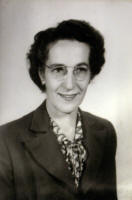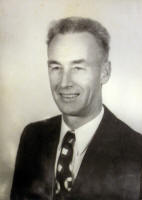George Holcomb Prosser CollectionM2007.6.1 |
|
|
|
|
| Title | George Holcomb Prosser Collection |
| Creator | George H. Prosser |
| Alt. Creator | Gwynne P. Smith [daughter] |
| Identifier | http://toto.lib.unca.edu/findingaids/mss/prosser_george_h/default_prosser_george_h.html |
| Subject Keyword | George H. Prosser ; Gwynne P. Smith ; Barbara P. Kerr ; poetry ; Appalachia ; American Enka Corporation ; Smoky Mountians ; recreation ; Great Depression ; western North Carolina life ; Gertrude Parker Prosser ; moonshining ; camping ; poems ; Edgar Guest ; |
| Subject LCSH |
Prosser, George H., 1895- Prosser, Gertrude Parker Prosser Smith, Gwynn Prosser Kerr, Barbara P. Enka Village -- History American Enka Corporation -- History Textile manufacturers -- North Carolina North Carolina, Western -- Social life and customs North Carolina, Western -- Poetry |
| Description | A small collection of poetry written by George H. Prosser while he worked at American Enka Corporation, a rayon processing plant located in Candler, NC. The poems, referred to as "doggerel" by Prosser, tell of his work, his friendships, the family life-style during the Depression, camping, and other recreation enjoyed by the family. The poems are a graphic reflection of the time and the culture in which Prosser and his family lived. They reflect one man's struggle with tough economic times and portray the rural and urban cultural tug of war familiar to many who have experienced similar shifts of culture. |
| Publisher | D.H. Ramsey Library, Special Collections, University of North Carolina at Asheville 28804 |
| Contributor | Barbara P. Kerr (daughter) |
| Date original | 1920's - 1930's |
| Date digital | 2007-05-24 |
| Type | Collection ; Text |
| Format | photocopy of 31 pages on 8 x 10" non-archival paper. |
| Source | M77.9.1-7 ; OS77.9.1-11 |
| Language | English |
| Relation | John E. Jervis Labor Collection, D.H. Ramsey Library, UNC Asheville ; |
| Coverage | 1928- ; Asheville, NC ; Western North Carolina |
| Rights |
Any display, publication, or public use must credit the
D.H. Ramsey
Library,
Special Collections, University of North Carolina at Asheville. Copyright retained by the creators of certain items in the collection, or their descendents, as stipulated by United States copyright law. |
| Donor | Donor number 138 |
| Acquisition | 2007-05-17 |
| Citation | George H. Prosser Collection, D.H. Ramsey Library, Special Collections, University of North Carolina at Asheville, 28804 |
| Processed by | Special Collections staff, 2007 |
| BIOGRAPHY |
[Notes from Gwynne Prosser Smith (daughter).] Some of our father's story George Prosser, our father, was born in 1895 in near Springfield, Ohio. He grew up on a Shetland pony farm and later a dairy farm. During the first World War, he served in France, assigned to the Heavy Artillery because he could handle horses and the city boys couldn't. There were no mechanized units then, and both the cannon and the munitions cassions were horse-drawn and man-pushed. The wheels were 6 feet in diameter, and frequently the wagons were frequently sunk into mud down to the axle. George pulled the horses' heads guiding them and encouraging them up and down the slopes and through the mire. After the war, he and Gertrude Parker Prosser, also of Springfield, married and in due time had a little boy who had severe asthma and heart trouble. In December 1923 they moved to Asheville, N.C., hoping that the climate would help his health. They arrived in Asheville, with the sickly boy Dale, and another baby on the way. (I was born June 1924, and my sister followed in Dec. 1925. Dale died about 1928.) When they first arrived in 1923, George found work unloading raw lumber off box cars. His pay for the Xmas week was $6.00. Near the lumber cars, they were unloading cabbages and throwing out the damaged ones. Our father took these home and cabbage was the basis of their diet for a while. Later George drove a gasoline delivery truck and then about 1927 or 28, he got a job helping construct the new Dutch rayon plant, "Enka", between West Asheville and Canton. When the plant opened, he was very fortunate to be hired as one of the permanent workers. It stayed open during the Depression and though the paycheck was small, it^sleady.and increased with new responsibilities until he became superintendent of the new Salvage Department. This was a very early effort not to throw away useful material. This department restored or repaired plant equipment before it was reinstalled in the production line. What could not be salvaged was sold for scrap. Through the years, Mother was able to manage the family on the small income. During the Depression years, it was a matter of honor that she went out immediately and spent his paycheck to set the funds flowing in the community. The grocery, the hardware store and the variety store were desperate for customers and she got good bargains. From the North where they each had many relatives and knew a lot of people, they had moved into a community which had a great mistrust of northerners. To deal with their sense of isolation, they actively worked to develop a wide range of friends at school and at work. Over the years, Dad wrote a lot of poems which tickled his fellow workers. He called them 'doggerel'; I thought they sounded like Edgar Guest.* Many of these were published in the monthly "Enka Voice". They touched on recent happenings, or gossip that every one in the plant knew about. People got a kick out of seeing stuff about themselves in print. Some of these may be still kept in the Enka Voice archives, if such a file exists. Some of the poems he wrote for himself, but most were widely shared. I did not realize until years later how unusual was the relationship between the mountain men and my father. They really trusted this northerner as one of their own. Amazing! and a tribute to my dad. Mother was friends with the women, too. Our family went with a group of 4 or 5 native families, camping and fishing together all over the mountains of western North Carolina during the depression years. Gas was cheap, and being in the out-of-doors was a good way to spend the weekends. Our major source of protein during this time was rainbow trout they caught in the little mountain streams.
On the weekends, our little
group of cars would search out the most remote streams they has heard
about, to try the fishing. Even in places where there was no apparent
land owner, as soon as the men started setting up camp, someone (usually
a man) would appear out of the woods (usually with a gun) and carefully
check us out visually and ask questions. Much of the time we were on
Cherokee land which later became part of the Smoky Mountain
National Park. No matter where we were, after slow and lengthy conversations, someone in our group could find a common relative (example: second cousin twice removed) which would then make us all acceptable. Otherwise it was a little bit harder to get permission to camp. The men did the talking; women and children (i.e. girls) sat quietly in the cars waiting to be told if it was OK to stay.
This may give you a little 'feel' for the ties of blood and the suspicions about those who were not related to someone known. Dad's friends must have done a good job of vouching for him because I can't remember our being harassed ever. Gwynne Prosser Smith (daughter)Delaware, May 15, 2007 [*British born Edgar Guest was often called the "People's Poet," and wrote poetry about every-day life for the Detroit Free Press. His work was syndicated to many newspapers in the U.S. and was widely read in the early years of the twentieth century. Guest died in 1959.] |
| George Holcomb Prosser Collection - Poetry | |||||
| Box | Folder | Item |
Description |
Thumbnail | |
| 1 | 1 | Group I | |||
| pros004 pros005 |
Strike at Enka 1941 |
 |
|||
| pros006- pros007 |
Hattie's Boy |
  |
|||
| pros008- pros009 |
My Sister's Boy | ||||
| pros010 | Do You Suppose ? |
 |
|||
| pros011 pros012 |
Do You Suppose II |
 |
|||
| Group II | |||||
| pros013 | Look Out Pop |
 |
|||
| Group III | |||||
| pros014 pros015 |
Vacations |

|
|||
| pros016 pros016a missing |
North Fork |

|
|||
| pros017 pros018 |
Young Knight |
 |
|||
| Group IV | |||||
| pros019 | Grandbaby |
 |
|||
| pros020 pros021 |
Do You Suppose III |
 |
|||
| pros022 pros023 pros024 pros025 pros026 |
Tennessee Creek |

scan |
|||
| Group V | |||||
| pros027 pros028 |
Cascade Lake |
 |
|||
| pros029 pros030 pros031 pros032 pros033 |
Salvage Saga |

|
|||


















